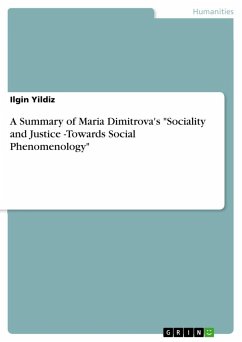Document from the year 2024 in the subject Philosophy - Miscellaneous, grade: 1,0, Sofia University St. Klimment Ohridski, course: social philosophy, language: English, abstract: Philosopher Maria Dimitroväs work "Sociality and Justice ¿ Toward Social Phenomenology" derives its theoretical foundation from Levinas¿ philosophy in order to rethink, critique, and reframe fundamental notions of sociality and justice that have historically been construed through a generalizing, typifying, and totalizing lens in Western/modern philosophy. The fundamental social relation, argues Dimitrova, contrary to conventional philosophies, is not between individual and society, but rather, between individual and the Other. Accordingly, the conceptual cornerstone of her argument is intersubjectivity. In conjunction with the examination of sociality and justice, key concepts and notions such as self, subject, other(ness), ethics, morality, universality, plurality, community, freedom, and language are problematized, reworked, and reframed by Dimitrova through a Levinasian lens, by introducing the theoretical tool of radical difference and alterity. The outcome of this intellectual endeavor leads to unconventional understandings of commonplace concepts and issues, offering insights into both personal/social and ethico-political paradigms, and advocating for a praxis of difference. Thus, we begin from the Other.








